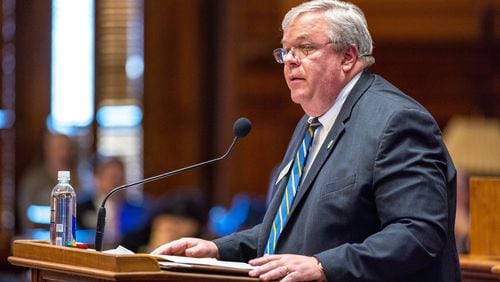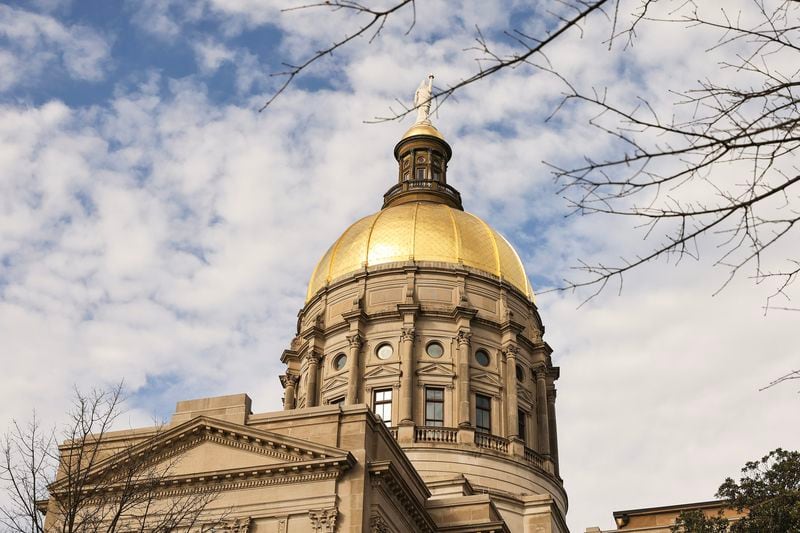The Georgia House and Senate approved a record midyear budget Monday that includes money for major renovations on Capitol Hill, a new medical school at the University of Georgia, roads, rural airports, local water and sewer projects, and rural economic development programs.
The chambers backed most of the spending hikes Gov. Brian Kemp proposed in January, even though state tax collections have been slow for much of the past year and are not projected to improve anytime soon.
But with $16 billion in “rainy day” and undesignated reserves, Kemp and lawmakers see the midyear budget — which runs through June 30 — as a chance to allocate money for big construction and infrastructure projects that will both better prepare the state for the future and put more Georgians to work.
The House passed the budget 169-2, and the Senate 52-1, sending the spending plan to Kemp for his signature.
Tax collections were slow for most of 2023 after three years of skyrocketing growth, which allowed the state to build up those reserves.
That matters because the money the state collects in taxes helps pay for K-12 schools, colleges, public health care, prisons, policing, business regulation, roads and a host of other services.
The state spent about $26.6 billion — excluding federal funding — in fiscal 2020, the last budget plan approved before the COVID-19 pandemic hit. Last year, it was more than $32 billion, and the midyear plan would spend almost $38 billion for fiscal 2024.
“There is much to be proud of in this, and much good is being done with it,” said House Appropriations Chairman Matt Hatchett, R-Dublin.
The budget covers a range of major infrastructure and education projects, including a new medical school at UGA, a new dental school at Georgia Southern University, large-scale computer system upgrades, more money for sewer improvements and massive spending on building roads. The state would spend an additional $1.5 billion alone on road building and maintenance.
A late add was nearly $400 million to build a new legislative office building and renovate the state Capitol. That was made possible by Kemp deciding revenue collections will be better than originally expected in the first half of 2024. Lawmakers can’t budget more money than the governor estimates will come in.
Credit: Natrice Miller/AJC
Credit: Natrice Miller/AJC
The state would also spend $37.5 million on renovations at the Atlanta Farmers Market, and $436.7 million would go for a new state-of-the-art prison in Washington County as well. Lawmakers added $19 million to improve security in prisons.
The midyear budget includes $29.25 million for public safety and infrastructure costs related to the 2026 FIFA World Cup and 2025 College Football Playoff National Championship events in Atlanta.
The General Assembly is run by rural lawmakers, and so Kemp and leaders in the House and Senate also included big money for projects in those areas.
The budget would put $100 million into supporting rural economic development projects and expanding grant opportunities for rural site development. The House and Senate added $98 million for aid to small-town airports, another favorite program for rural legislators.
The chambers went along with Kemp’s proposal to spend $500 million propping up the state’s pension system for retired state workers. Lawmakers have said they hope that will mean in the future a return to providing cost-of-living increases for retirees, something they have rarely received since 2008.
The chambers added $1.55 million for exhibits at the Anne Frank Education Center. The House and Senate had originally added $2 million to the budget, but that was cut back in the final deal, a move that Rep. Esther Panitch, the only Jewish member of the state Legislature, questioned given the rise in antisemitism.
The move comes less than a month after Kemp signed into law a bill with new protections against antisemitism.
Lawmakers omitted $5 million from the budget that Secretary of State Brad Raffensperger’s office had sought for technology to double-check the accuracy of computer ballot counts.
The technology would have scanned the text of voters’ choices to verify that ballot scanners tabulated votes correctly from QR codes. Senate Republicans objected to the funding after Raffensperger’s staff took offense to a question over whether his employees would benefit financially from the project.
Capitol Recap: The 2024 Legislative Session
Want to know what legislators did this past week and how it might affect you? Check out our weekly newsletter, Capitol Recap: The 2024 Legislative Session, every Friday.
To subscribe, go to https://www.ajc.com/subscribe-2024-legislative-session/.
About the Author
Credit: AP









